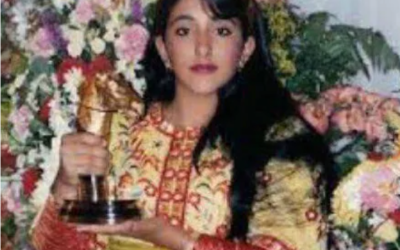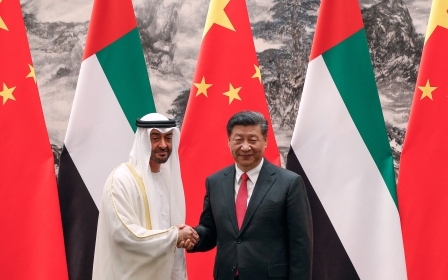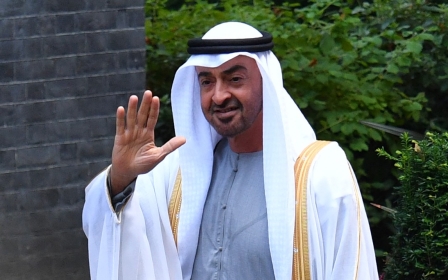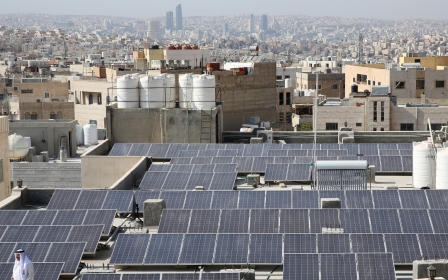Who is Ahmed Naser al-Raisi, the new Interpol chief accused of torture?
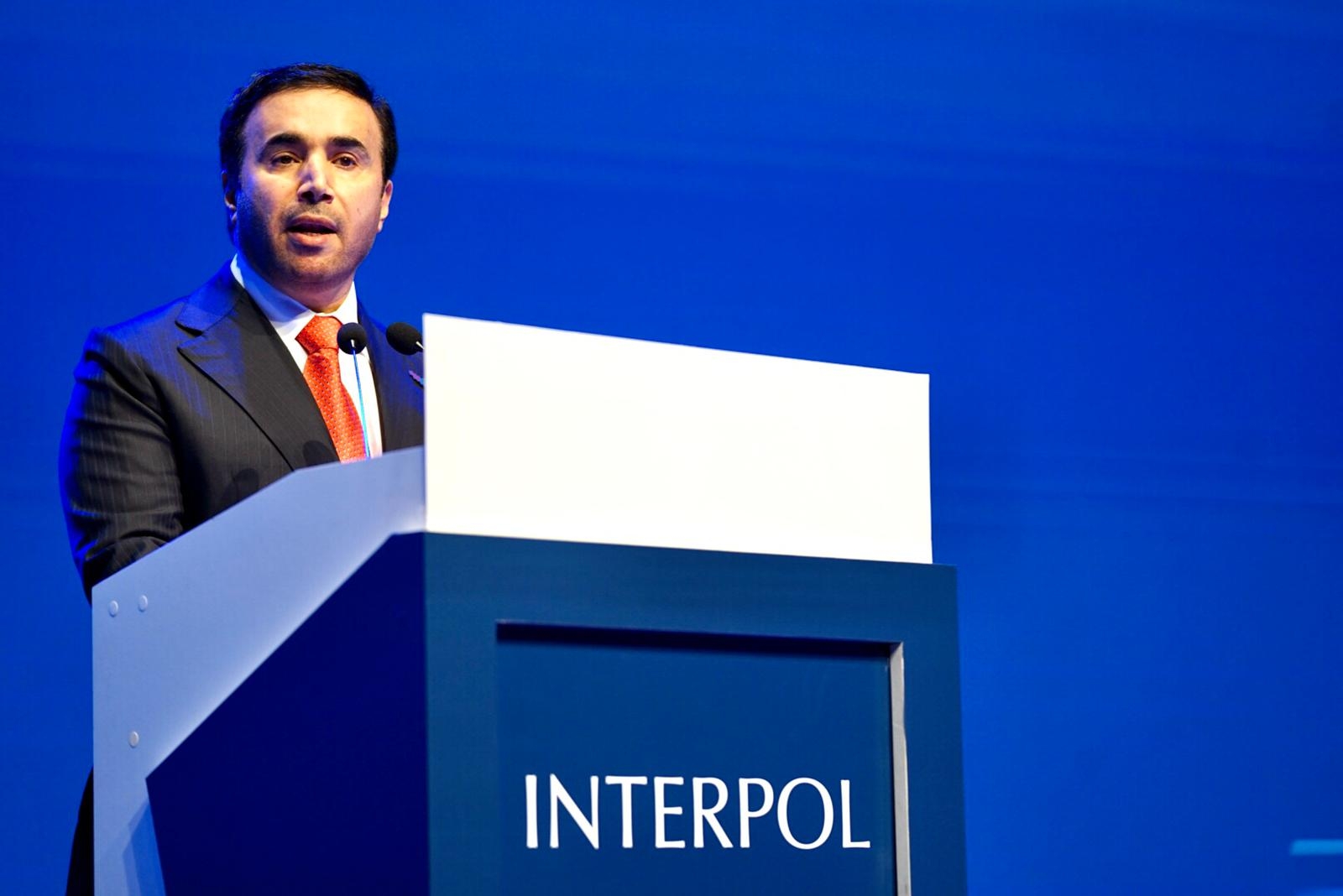
Delegates on Thursday elected Ahmed Naser al-Raisi, an Emirati general accused of torture, as president of Interpol, the body that facilitates international cooperation between police agencies.
The vote was made at Interpol's 89th general assembly, which is taking place from 23-25 November in Istanbul, despite the concerns of human rights organisations and members of the European Parliament.
"Mr Ahmed Nasser AL RAISI of the United Arab Emirates has been elected to the post of President (4-yr term)," Interpol said on Twitter.
Raisi, inspector general of the Ministry of Interior in the UAE, was chosen over the other candidate in the race, Sarka Havrankova, chief director of the Police Presidium of the Czech Republic and current Interpol vice-president for Europe.
He will succeed current president, Kim Jong Yang, who has held the role since 2018.
New MEE newsletter: Jerusalem Dispatch
Sign up to get the latest insights and analysis on Israel-Palestine, alongside Turkey Unpacked and other MEE newsletters
The possibility that Raisi would end up leading the organisation had alarmed human rights organisations, who say the Emirati official has overseen numerous abuses in the Gulf state, including torture, sexual abuse, arbitrary detention and enforced disappearances.
However, Raisi was very much the favourite to win the role and had widespread support from member states.
In addition to selecting a new president, member states are set to replace most of the agency’s executive committee.
Raisi had undertaken international tours to lobby for his candidacy, while in recent years the UAE has invested heavily in Interpol. In 2017, the UAE pledged $56m to the organisation, approximately a third of the force's annual budget, leading several human rights groups to accuse the UAE of trying to buy influence.
A report on the UAE and Interpol by lawyer David Calvert-Smith, published in April, noted that the Interpol Foundation for a Safer World, an affiliated not-for-profit organisation that was Interpol's third-largest external contributor in 2018, was "totally reliant on the UAE" and it seemed its "sole purpose is to be a channel by which to funnel cash from the UAE government into Interpol".
“To date, Interpol’s election process for its officials has been opaque, which means there can be no public scrutiny of the process itself and how the candidates have been vetted," said Bruno Min, legal director at Fair Trials, a UK-based organisation that campaigns for fair and equal justice systems.
"Without this, we have no way of knowing what to expect from candidates with regard to their commitment to human rights.”
'Dynamic personality'
Raisi joined the Abu Dhabi police force in 1980 as part of what his website refers to as the "burglar alarm branch", and eventually advanced to general director of central operations in 2005. He took up his current post as inspector general of the Ministry of Interior in 2015.
According to the Calvert-Smith report, Raisi found time to acquire a doctorate from London Metropolitan University, an MBA from Coventry University, a diploma from the University of Cambridge, and a BSc from Otterbein University, Ohio, and was described on his own website as "a dynamic personality, with strong presence in diverse activities inside and outside the police institution".
'It's frightening. That's why we raised so many complaints and we're doing our best - the Interpol delegates should know this guy's profile, it's very necessary'
- Ali Issa Ahmad, former British detainee in the UAE
Writing in the National in September, Raisi said he wanted to "modernise and transform" Interpol, citing the increasing rise of cyber security threats and advanced technology in the hands of criminals - he emphasised how the UAE had invested in the latest security techniques and technology, making it one of the "safest, most prosperous nations in the world.
"We, as a nation, have always focused on building consensus, and acting as a mediator, by focusing on what unites us rather than what divides us," he wrote.
Such words are likely to ring hollow for many, particularly the numerous political prisoners and detainees who have been imprisoned and allegedly abused in the country during Raisi's tenure.
Among those who have hit the headlines are Emirati dissident Ahmed Mansoor, who has been imprisoned in the UAE since 2017. A lawsuit filed by the Gulf Centre for Human Rights earlier this year accuses Raisi of “acts of inhumanity and torture” with regards to Mansoor.
'This is insane'
Two others are British citizens Matthew Hedges and Ali Issa Ahmad. The former is a student who was imprisoned in the UAE for seven months and sentenced to life imprisonment after abuse and an allegedly forced confession; while the latter is a 28-year-old from the city of Wolverhampton who was arrested in the UAE in 2019 after attending an Asian Cup football match there.
Hedges and Ahmad are both bringing legal cases against Raisi, and on Monday announced they had filed a lawsuit against him in a Turkish court.
The complaint is the third torture criminal complaint under universal jurisdiction filed by the two in 2021, following similar attempts in England and France.
It could, if accepted by the Turkish prosecutor, see Raisi arrested by local police, as he does not have diplomatic immunity.
Ahmad was detained between 23 January and 12 February 2019. It is thought that he was arrested for wearing the football shirt of UAE's arch-rival Qatar, though the UAE has denied this.
During his time in prison, Ahmad was subjected to racial and psychological abuse and torture, including being beaten, electrocuted, cut and burned. At one point he was sent to a doctor and forced to sign a form saying that the injuries he suffered - including having one of his teeth knocked out - were self-inflicted.
"It's frightening. That's why we raised so many complaints and we're doing our best - the Interpol delegates should know this guy's profile, it's very necessary," he told MEE ahead of the vote.
He said that if Raisi were to gain influence over Interpol, it would help give a free pass to the UAE to continue to pursue dissidents and others wanted by the Emiratis overseas.
"Raisi for the leadership - this is insane, you know."
Open to abuse
Interpol has long faced criticism as an organisation for its failure to reform its controversial red notice system, whereby member states can issue alerts to others that an individual's arrest is sought.
A total of 13,377 red notices were issued in 2019 and there are currently at least 62,000 live notices. While they do not carry any official legal weighting, different Interpol member states respond to them differently.
Although red notices can be appealed and removed if they violate Interpol's rules and constitution, the process can be difficult.
Yuriy Nemets, a US-based lawyer and expert in Interpol abuse cases, told MEE in 2019 that those wishing to dispute a red notice did "not have the right to a hearing, to examine evidence that governments produce against them, or the right to appeal the commission's decisions".
The UAE, in particular, has become notorious for using Interpol red notices as a means of tracking down and harassing people who owe debts in the country - something that most countries would not regard as a crime.
'There are numerous examples of countries like Turkey, Russia, China, among others, who utilise the significant power of the Red Notice to hunt for political opponents outside of their borders'
- Sandra Grossman, solicitor
According to the Calvert-Smith report, the UAE effectively uses Interpol as its own "private international debt collection agency".
Sandra Grossman, a solicitor who has testified in the US Senate about the abuse of Interpol red notices by states as a means of transnational repression, said the election of Raisi would send "absolutely the wrong message" and gave little hope for reforming the organisation.
"Interpol is a valuable and critical organisation for fighting transnational crime, but due to some deficiencies within its own system, it is also subject to misuse and abuse by autocratic regimes," she told MEE.
"There are numerous examples of countries like Turkey, Russia, China, among others, who utilise the significant power of the red notice to hunt for political opponents outside of their borders."
She noted that Secretary General Jurgen Stock had attempted in recent days to emphasise that Raisi would largely have a symbolic role as president and would still primarily remain in his job in the UAE.
"I think the secretary general’s comments significantly downplay the power of the role of the president and the symbolic significance of electing someone like Raisi, who has been accused of torture by what I understand to be several reputable human rights organisations and individuals," she said.
'I get traumatic flashbacks'
On Tuesday, Interpol delegates voted to reform the process for electing members of the executive committee.
Stock praised the changes as an important first step towards "greater transparency" in the organisation's governance.
“It is imperative that we promote trust in the organisation and maintain its reputation both among our member countries and public opinion," he said, according to a statement on Interpol's website.
“The changes which were overwhelmingly supported by the general assembly will enable the executive committee to set clear rules regarding ethics, accountability and integrity by its members, increasing both awareness and confidence in its activities."
While the move was welcomed by campaigners, it will not affect the presidential elections, which continue to be "opaque" and lacking in scrutiny.
In a statement to MEE, Interpol said the election of Raisi was "an issue between the parties involved" and said that "no trade-off exists between 'the widest possible mutual assistance' by criminal police and 'the spirit of the Universal Declaration of Human Rights', or our neutrality."
Ahmad is still suffering from what happened to him in 2019. The experience has left him traumatised, and the thought that the individual he says oversaw that trauma could end up heading one of the most powerful transnational bodies in the world is deeply disturbing.
"Until now I've relied on medicine to sleep and forget the things that happened to me... I get traumatic flashbacks," he said. "If he is elected, Interpol will be corrupt... it's really concerning."
Middle East Eye delivers independent and unrivalled coverage and analysis of the Middle East, North Africa and beyond. To learn more about republishing this content and the associated fees, please fill out this form. More about MEE can be found here.


